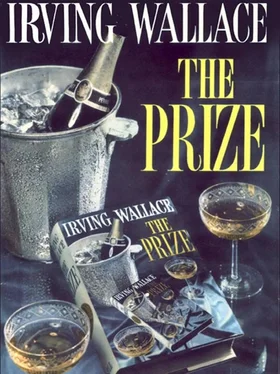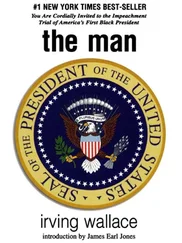Hammarlund opened his hands towards her, at once self-reproachful and penitent. ‘Forgive me, Dr. Marceau-at times, I am so clumsy with the language-but I meant to imply no such thing. I apologize, believe me, if I exceeded good taste in a mere desire to be hospitable.’
Convinced of his sincerity, Denise softened. ‘No, the fault is mine. I am afraid I am overwrought. Blame it on the trip, the excitement, this whole royal formality-’ Beyond him, she saw Claude and Jacobsson walking towards her. ‘Here they come now. You will enjoy my husband. He is better-behaved at these social affairs.’
When Claude, holding a new drink almost colourless, arrived, with Jacobsson a step behind, Denise immediately spoke to him. ‘Mr. Hammarlund has been most engaging, but I have given him a difficult time.’
‘Quite the contrary,’ Hammarlund protested.
Denise continued to address her husband. ‘You will find Mr. Hammarlund a patron of chemistry, and you will be flattered to know that he is acquainted with our earliest work.’ She turned abruptly to Jacobsson. ‘I have exchanged hardly a word with the other winners. I think I should do so.’ She took Jacobsson’s arm. ‘Will you escort me, Count?’
The gathering, the largest in the White Sea Room, had been kneaded into a tight circle by the comings and goings at its periphery and by a common desire to keep the discussion informal. Included in the gathering, from the point where Denise Marceau had been admitted to it five minutes before, were-left to right-Saralee Garrett, John Garrett, an earnest and acne riddled young Swedish Prince in uniform, Margherita Farelli, Carlo Farelli, Konrad Evang, Emily Stratman, Max Stratman, Carl Adolf Krantz, and Count Bertil Jacobsson.
The young Prince, in a learned falsetto, was giving a biographical discourse on Alfred Nobel, in response to Margherita’s thickly accented question about the donor. John Garrett listened with impatient courtesy, shifting his weight from one leg to the other. Garrett was interested in neither information nor entertainment, but in assassination. Like a hunter in hiding, he had no time for the appearance of the minor animals. He wanted only the king of beasts.
Since his fiasco at the press conference, Garrett had revaluated his own worth and decided that he was deserving of a defence to the death. Never again, he had vowed, would he let the Italian treat him as a satellite ally. Now, as the talk flowed, he waited for Farelli to speak up, so that he might interrupt or contradict him and thus reveal him as unworthy of invitation to this select circle. The wait was irritatingly protracted. Eager as Garrett was to pounce, there was no prey. The Farelli of the afternoon, vocal and vulnerable, was no longer in evidence. Tonight, he was subdued. Tonight, handsome in a black wool suit, English-tailored in Rome, he listened. It was as if he scented a lurking danger and preferred to hide behind anonymity. Garrett ground his teeth and marked time.
The young Prince was going on shrilly about Alfred Nobel. ‘-is another reason we so fervently admire him. He overcame all odds. His father was twice a bankrupt. Nobel, himself, had no formal education, never once graduated from a school. This will interest you especially, Professor Stratman. You were speaking of John Ericsson-the builder of the Monitor for Lincoln-and his early experiments in trying to accomplish what you accomplished, harness the sun’s rays. Did you know that Nobel met Ericsson in America?’
‘That is really true?’ asked Stratman.
‘It is in our histories,’ said the young Prince. ‘Nobel was only seventeen. Ericsson showed him the engine he hoped to run with solar energy, and this inspired the inventive streak in Nobel.’
‘And then Nobel invented nitroglycerine,’ said Garrett importantly.
‘I do not believe that is quite correct, Dr. Garrett.’ It was Farelli who had entered the conversation. ‘Nitroglycerine-blasting oil-was discovered by one of my countrymen, some time before Nobel-Professor Ascanio Sobrero, of Turin.’
‘True,’ the young Prince confirmed.
Garrett’s confidence sank beneath the new setback. He had been over eager. The prey had stalked the hunter. Farelli was again ahead. Garrett determined not to make the same mistake twice.
‘What Nobel accomplished was to invent the blasting cap,’ the young Prince was saying, ‘and later safety powder, made of nitro combined with German clay, which was what started the great dynamite business and made him a millionaire. But as I was remarking, for him it was always a battle against odds. In the pioneer stages, the explosive blew up his factory and killed his younger brother. He had to move his laboratory to a pontoon raft in the middle of a Swedish lake. By accident, this liquid exploded ships off Germany and Panama, a whole city block in San Francisco, a warehouse in Australia. Once, I am told, your American Senate’-he spoke to Garrett now-‘seriously debated a bill to make the shipping of Nobel’s liquid a crime to be punished by hanging.’
‘Yes,’ said Garrett, ‘my fellow Americans are often very suspicious of science. When I was doing my work in heart transplants, I received many threatening crank letters warning me not to try to compete with God.’
Farelli said nothing, and Garrett felt the warmth of a small victory.
‘Fortunately, Nobel learned to tame and control his dynamite,’ said the young Prince, ‘and in ten years, he had fifteen factories and was one of the richest men in the world-almost as rich for his day as our celebrated Mr. Hammarlund is in this day.’
Farelli moved to speak, and immediately Garrett was ready. ‘Most interesting,’ Farelli said. ‘But I am curious about another thing. Here we all are, the laureates from the ends of the earth, the benefactors of Nobel’s generosity. Yet I know next to nothing about my benefactor himself, his personal character, life. What was he really like?’
Garrett pounced. ‘Surely, Dr. Farelli, you have read at least one of the countless articles or books on Nobel? They are there for all to see. I have read many, and I feel I know him as well as I know any of my relatives.’
‘You must read between the lines then, Dr. Garrett,’ the Italian replied. ‘I was not saying that I had not read about Nobel. I was saying that, despite all I have read, I still know nothing about him. What kind of man is it who can put forth dynamite, so destructive, and also put forth prizes for peace on earth and idealism in literature and discoveries that benefit mankind?’
‘Guilts, all guilts,’ said Garrett in a fading tone, desperately drawing on the patois of Dr. Keller and the therapy group. ‘He was compensating for his guilts. It is obvious to see.’
Count Bertil Jacobsson cleared his throat. ‘If I may comment-’
‘Count Jacobsson knew Nobel personally,’ the young Prince interjected.
All eyes were on Jacobsson, as he went on. ‘-I would be inclined to agree with Dr. Farelli that Nobel remains, to this day, an enigma. No book has captured his contradictory nature. Yes, I knew him briefly, but in a sense, I have lived with him all of my life, yet I doubt that I know him at all.’
Listening, Garrett hunched his shoulders, to bury his head, as had been his habit when teachers had rebuked him in school. He felt Saralee’s sympathetic arm link inside his, but it was not enough.
‘Nobel was an atheist, but he read the Bible,’ Jacobsson was saying. ‘He was a bachelor who regarded women as repulsive, yet he admired the shapeliness of American young ladies. He would have been much impressed by Miss Stratman here.’
Farelli, Krantz, Evang, and the young Prince obeyed Jacobsson’s implied directive, and as one, appraised Emily Stratman’s endowments. Momentarily, she lost her poise, blushing, and then, automatically, she brought a hand up to hide the deep cleft between her breasts revealed by the low-cut gown that she had hesitated to wear and then defiantly worn.
Читать дальше












